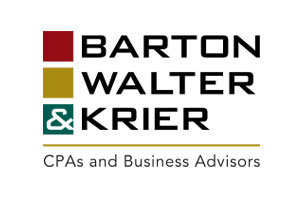Be Vigilant at Tax Time
February 15, 2022 | Barton Walter and KrierEach year the Internal Revenue Service puts together a list of scams to watch for when it comes to your hard-earned dollars. The annual IRS Dirty Dozen warns of tricks and schemes that occur throughout the year – and especially during tax-filing season. The federal tax deadline will be here before we know it, so the professionals at Barton, Walter & Krier wanted to highlight some common scams to help keep you vigilant at tax time.
Phony Phone Calls
Beware of phone calls claiming to be from the IRS and asking for personal information about you or your finances. As a rule, the IRS does not initially reach out to anyone by phone to discuss tax situations. A first-contact attempt most often comes via mail.
The IRS does not request personal or financial details via text or email. And you can rest assured that if the IRS does contact you by phone, you will not be asked to submit payment in the form of a gift card, prepaid debit card, or a wire bank transfer.
Do not give out your personal information. If you suspect the call is a hoax, hang up and report it to the Treasury Inspector General for Tax Administration.
Watch Your Donation Dollars
To claim a deduction for charitable donations, the organization in question must be a qualified charity. Many scammers, especially in the pandemic-era, will create fake charities to con generous people into gifting funds through manipulative means. If you feel pressured to donate, double check that the charity is legitimate before giving.
After verifying the organization, make your donations with a credit card or personal check – to leave a paper trail. Be suspicious if you are asked to donate through gift cards or wire transfers. Ask for the organization’s exact name, mailing address, charity ID number, and web address. All this information is helpful when verifying that your donation dollars are assisting the cause you intended.
Check Social Media Settings
A lot of scammers use social media to gather data they can use to swindle people through fake emails or tax-related identity theft. The more personal details someone else can collect, the easier it is for them to convince you or others of their hoaxes.
Be sure to check your privacy settings and only share necessary information with people you know. Limit the details you share publicly to avoid getting wrapped up in a crooked scheme.
Negotiating Tax Debts
Under unique and specific circumstances, some taxpayers may be able to settle their tax debts for less than the full amount owed. To be eligible for this Offer in Compromise (OIC) program, applicants must meet certain requirements and have explored all other payment options.
Some scam services promise misleading OIC acceptance guarantees for a fee. Your best bet is to contact the IRS directly to see if you qualify for an OIC.
Verify Your Tax Preparer
Make sure the person preparing your taxes is trustworthy and authentic. If he or she won’t sign your prepared tax returns – or e-sign, if filing electronically – be suspicious. Also be cautious of a preparer who forges numbers so clients qualify for tax credits, claims bogus deductions for a bigger refund, and requires cash payment without a receipt.
Your tax preparer should also have a valid and verified Preparer Tax Identification Number that accompanies his or her signature on your return. As the taxpayer, you are accountable for your return. Protect yourself by being sure the person preparing your taxes is on the up and up.
Count on BWK’s Tax Professionals
These are just some of the hoaxes that scammers use to take advantage of unsuspecting taxpayers and tax preparers. Read more of the IRS’s Dirty Dozen list of schemes throughout the year so you can be vigilant at tax time. If you have questions about tax scams or are looking for a trusted professional to prepare your tax returns, BWK can help. Contact us today to get the guidance and results you need this tax season – and beyond.

